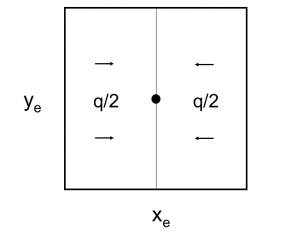Difference between revisions of "6/π stimulated well potential"
From wiki.pengtools.com
(→Math & Physics) |
(→Math & Physics) |
||
| Line 14: | Line 14: | ||
From Mass conservation: | From Mass conservation: | ||
| − | :<math>\frac{d(\rho q)}{2 dx}=y_e h \phi \frac{d\rho}{dt}</math> | + | :<math>\frac{d(\rho q)}{2 dx}=y_e h \phi \frac{d\rho}{dt}</math> (1) |
From [[Darcy's law]]: | From [[Darcy's law]]: | ||
| − | :<math>\frac{q}{2}=\frac{kA}{\mu}\ \frac{dP}{dx}</math> | + | :<math>\frac{q}{2}=\frac{kA}{\mu}\ \frac{dP}{dx}</math> (2) |
:<math> A =y_e*h</math> | :<math> A =y_e*h</math> | ||
| + | |||
| + | (2) →(1): | ||
:<math>dP=\frac{q \mu}{2ky_eh} dx</math> | :<math>dP=\frac{q \mu}{2ky_eh} dx</math> | ||
Revision as of 09:09, 12 September 2018
Brief
6/π is the maximum possible stimulation potential for pseudo steady state linear flow in a square well spacing.
Math & Physics
Pseudo steady state flow boundary conditions:
From Mass conservation:
 (1)
(1)
From Darcy's law:
 (2)
(2)
(2) →(1):
Integration gives: 
Since average pressure is: 
See also
optiFrac
fracDesign
Production Potential
Nomenclature
 = cross-sectional area, cm2
= cross-sectional area, cm2 = thickness, m
= thickness, m = permeability, d
= permeability, d = pressure, atm
= pressure, atm = initial pressure, atm
= initial pressure, atm = average pressure, atm
= average pressure, atm = flow rate, cm3/sec
= flow rate, cm3/sec = length, m
= length, m = drinage area length, m
= drinage area length, m = drinage area width, m
= drinage area width, m
Greek symbols
 = oil viscosity, cp
= oil viscosity, cp







